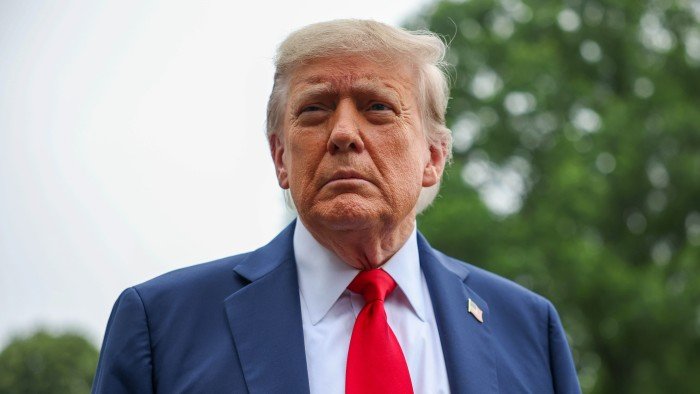This article is an on-site version of our FirstFT newsletter. Subscribers can sign up to our Asia, Europe/Africa or Americas edition to get the newsletter delivered every weekday morning. Explore all of our newsletters here
Today’s agenda: Nato summit; Monte dei Paschi share sale scrutiny; EU single market, Russia’s unjammable drones and an interview with Delphine Arnault
Good morning. We begin in the Middle East which is waking up to Donald Trump’s announcement of a ceasefire between Iran and Israel. Here’s the latest.
What happened: The US president last night said that Israel and Iran have agreed “a complete and total ceasefire”. He also said the truce would be implemented in stages, by Iran then Israel, over 24 hours.
Iran’s foreign minister later posted on X that there was no agreement, adding that Tehran had “no intention to continue our response” if Israel stopped its “aggression”.
Israel has not yet given a response about the ceasefire.
Israeli paramedics meanwhile said this morning that three people had been killed in an Iranian missile strike in the south of the country.
Market impact: Equity markets opened higher in Asia following the ceasefire announcement. The dollar weakened 0.3 per cent against a basket of its key trading partners. Oil prices extended declines as traders responded with relief. Brent crude, the international benchmark, fell 4.1 per cent to $67.61 a barrel.
Follow our live blog for the latest updates if de-escalation of hostilities materialises and holds. And here’s more coverage of the conflict:
-
Trump’s Iran policy: The head-spinning course changes on Tehran revealed once again how the US president alternates between blustery threats, efforts to cut deals, extreme measures and sudden victory laps.
Join FT journalists and guests for a webinar tomorrow exclusive to FT subscribers to help unpack the strategic, diplomatic and economic stakes of the Israel-Iran war. Register here.
Here’s what else we’re keeping tabs on today:
-
Central banks: Bank of England governor Andrew Bailey gives evidence in Westminster to the Lords economic affairs committee while Federal Reserve chair Jay Powell delivers his semi-annual monetary policy report before the House financial services committee.
-
Economic data: Germany releases the Ifo business climate index for June while the US reports on May state employment and unemployment figures.
-
Nato summit: Leaders from member states meet in The Hague for a summit aimed at placating Trump over defence spending. The gathering is at risk of descending into acrimony.
Five more top stories
1. Exclusive: Germany will boost defence spending by more than two-thirds by 2029, outpacing France and the UK as Chancellor Friedrich Merz drives rearmament of Europe’s largest economy in the face of an aggressive Russia and a volatile America. Anne-Sylvaine Chassany has more on the plans.
-
Macron and Merz: As norms erode and old certainties are challenged, Europe must act accordingly and arm itself for an unstable world, writes the president of France and chancellor of Germany.
-
Nato spending: Sir Keir Starmer will pledge to the alliance that the UK will raise defence funding to 5 per cent of GDP within a decade.
-
Transatlantic tie-ups: US defence companies are wooing European rivals as they target the region’s military spending spree.
2. Exclusive: The European Commission is examining the Italian government’s sale of shares in Monte dei Paschi di Siena last year, following claims that large investors such as UniCredit, Norway’s oil fund and BlackRock were shut out of the bidding process. Read the full report.
3. Currencies, stocks and bonds in developing countries are defying Trump’s trade war and the conflict in the Middle East to outperform global markets in 2025 as investors seek to diversify away from dollar assets amid concerns over erratic US policymaking.
4. Exclusive: The chief executive of Deutsche Bank’s asset management arm has urged European policymakers to adopt a more pragmatic stance towards investments from China and the Gulf, as Berlin prepares to spend hundreds of billions overhauling its creaking infrastructure. Read the interview with DWS chief Stefan Hoops.
5. Amazon founder Jeff Bezos and TV anchor Lauren Sánchez’s wedding in Venice this week has become a lightning rod for protest, as locals disgruntled with overtourism join climate activists to rage against a spectacle that to them epitomises many of the world’s ills.
The Big Read

More than three decades after it was launched, hundreds of barriers persist within the EU’s single market. In an era of trade wars, Brussels believes it can boost competitiveness by improving the flow of goods, services and capital. But earlier attempts to unite the bloc have floundered on national sensitivities. Translating a newly found political momentum into the necessary reforms proposed will be the toughest challenge.
We’re also reading . . .
-
Military briefing: Russia’s summer offensive is starting to gain ground in Ukraine, with Moscow’s forces aided by drones that cannot be jammed.
-
‘Chains of thought’: The world’s leading artificial intelligence groups are struggling to force AI models to show how they operate.
-
‘Verification problem’: As technology becomes better, a return to face-to-face encounters looks more likely, writes Stephen Bush.
Chart of the day
The main reason to worry about global trade imbalances is not the impact on manufacturing, which, for a country like the US, is a second order issue, but rather on financial stability. This is also why fiscal adjustment needs to be a co-operative venture when the participants are such big economies, writes Martin Wolf.

Take a break from the news

Last month, Dior chief executive Delphine Arnault appointed Jonathan Anderson as creative director to oversee both the men’s and women’s collections. Her decision to bring in the Northern Ireland-born designer is her biggest bet since she took the helm of the division in 2023. Read more on her plans to open a new chapter at LVMH’s second biggest brand.
